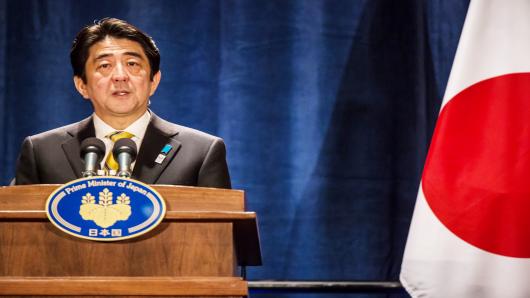South Korea's top economic policymakers, once anxious over the potential damage to their export-reliant economy from Japan's massive monetary expansion and the competitive challenge raised by a cheap yen, have grown more sanguine as their fears fail to materialise.
"Abenomics", the plan by Japan's Prime Minister, Shinzo Abe, to double the amount of money circulating in the economy, sent the yen tumbling and could have unleashed heavy inflows of hot money into Korea by investors seeking quick, higher yields.
A weaker yen gives Japanese exporters a pricing advantage over their South Korean rivals, but the overall impact has been muted as Korean makers of products from smartphones to cars have improved their competitiveness in global markets.
Exports for the January-March quarter posted the first annual growth in a year, although sales to Japan fell from the unusually strong performance seen in early 2012 associated with Japan's earthquake reconstruction effort.
(Read More: Fiscal Cliff Not for Us: South Korea Fin Min)
Despite concerns about a hot-money inflow, South Korea saw a net outflow in capital and financial accounts this year on falling interest rates and as the won also weakened, an unintended but handy side-effect of military tensions with North Korea.
"Hot money flow is something that we can never be complacent about, but the yen is different from the dollar and there's no sign yet (of heavy capital inflow)," Cho Won-dong, top presidential economic policy aide, said by telephone.
South Korean officials see the yen's decline until now more as the normalisation of its overshooting since the 2008 global financial crisis than a rout. The yen had been more than 20 percent above its pre-2008 levels until late last year.
(Read More: G-20 Criticism Unlikely to Derail Yen's Fall)
In stark contrast, the won had been far weaker than its pre-2008 levels as global investors shunned riskier assets such as emerging-market currencies and flocked to safer investments.
Fading Concern
After a strong rise in the last months of 2012, the won dropped 3.6 percent against the dollar for the first quarter of this year, the worst in one and a half years and helping offset the comparative appreciation against the yen, which fell 8.0 percent against the U.S. unit.
The Bank of Korea also shrugged off the potential risks from Abenomics and left its benchmark interest rate unchanged at 2.75 percent last week, a big surprise move in defiance of government and financial markets pressure for a cut.
"Given that the MPC kept the policy rate unchanged last week, I think it's safe to say that the MPC is not that worried," said Tim Condon, economist at ING in Singapore, referring to the Bank of Korea monetary policy committee that sets rates.
The Bank of Korea is expected to keep focusing more on domestic factors than on the Abenomics -- such as the depressed local property sector, signs of deleveraging by households after years of over-spending, and the slowing pace of job creation.
(Read More: Is a Big Change in China's Currency Policy Imminent?)
"Perhaps they (the MPC) have adopted the long-run perspective that a re-invigorated Japan ultimately will be positive for Korea," Condon said.
A weaker yen helps those South Korean manufacturers because the Japanese-made machinery and production tools on which they rely fall in price. Customs data shows, in volume terms, South Korea buys more than 20 percent of its capital goods imports from Japan.
South Korea also has problems of its own that would hamper a more aggressive response to the yen's slide. It has frequently seen heavy capital flight at times of global stress even when its own economic fundamentals seemed sound.
Analysts say South Korea, which was rescued by an international bailout from the 1990s Asia financial crisis, should worry more about the won's fast decline because that could quickly cause a massive selloff by foreigners.
"As we have seen in the past, the won's sharp drop can easily spark a vicious circle by spurring a capital flight which in turn sends the won down further," said Yoon Deok-ryong, senior research fellow at the Korea Institute for International Economic Policy.Yoon was the adviser to the finance minister in late 2008, when the won fell almost 30 percent against the dollar in just two months and the central bank had to dump billions of dollars to prevent repeating a 1990s-style currency crisis.


